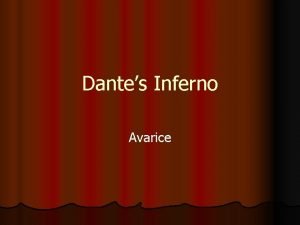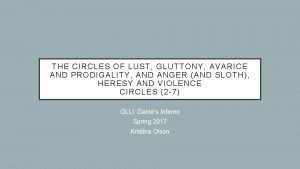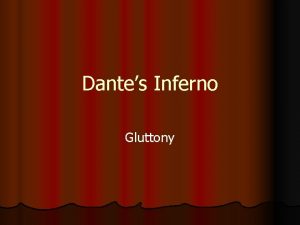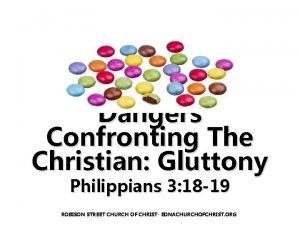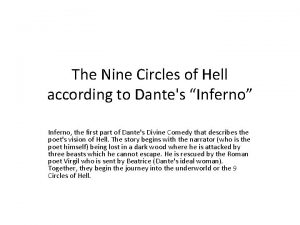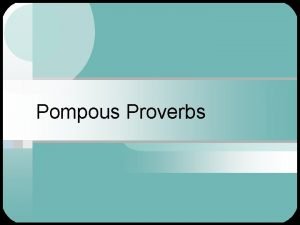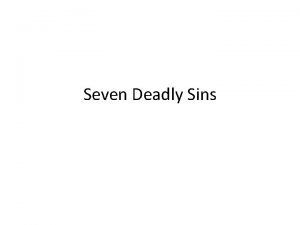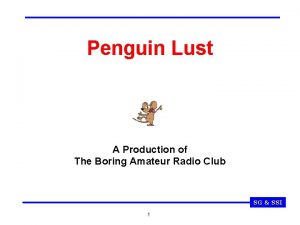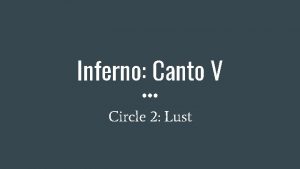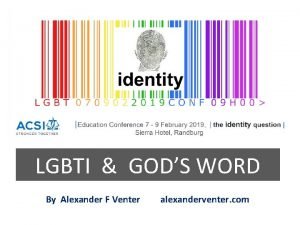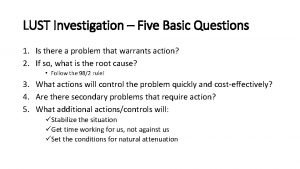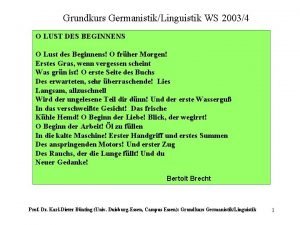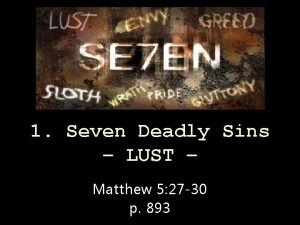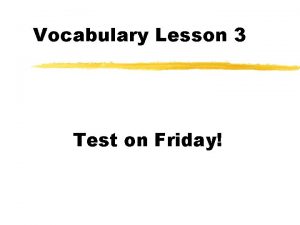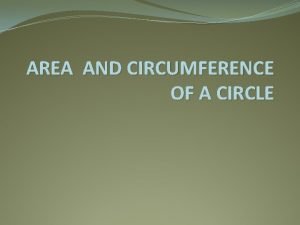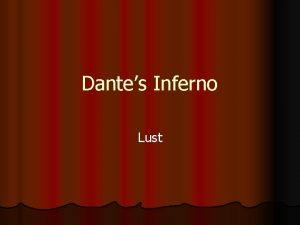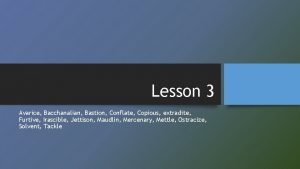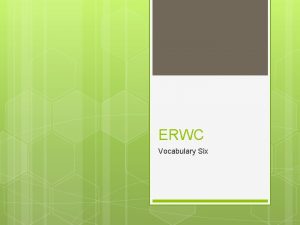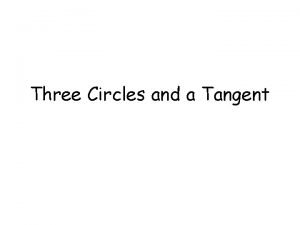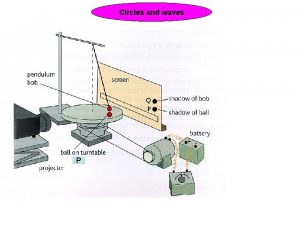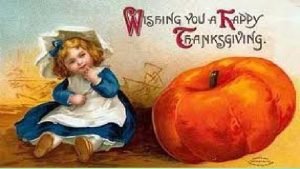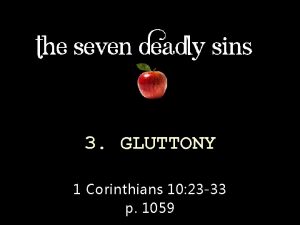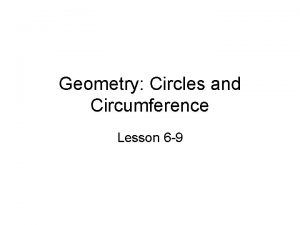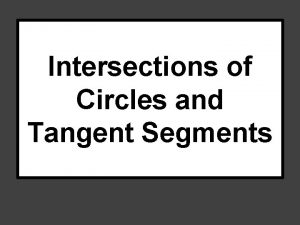THE CIRCLES OF LUST GLUTTONY AVARICE AND PRODIGALITY


























![HOW DO WE DEFINE “REALISM” FOR THE DIVINE COMEDY? • “[…] from the fact HOW DO WE DEFINE “REALISM” FOR THE DIVINE COMEDY? • “[…] from the fact](https://slidetodoc.com/presentation_image_h/9760b59e8884a9bbcbc77a46d9723360/image-27.jpg)



















- Slides: 46

THE CIRCLES OF LUST, GLUTTONY, AVARICE AND PRODIGALITY, AND ANGER (AND SLOTH ), HERESY AND VIOLENCE CIRCLES (2 -7) OLLI: Dante’s Inferno Spring 2017 Kristina Olson

ANOTHER NON-TRIVIAL ITEM • The first literary reference for pizza appears in the context of the Harpies (which we see in Inferno 13) from their original appearance in Aeneid 3. 209 -67. • Celaeno, a harpy with the gift of prophecy, foretells that the Trojans will not achieve their mission in Italy until they are forced to “eat their tables. ” When the Trojans eat the bread upon which they heaped vegetables from their harvest in book 7, they realize that this prophecy has come true.

NOTICING WHAT YOU NOTICE • As you read Inferno for this week, what were the questions that arose in your mind? • Why does it mean that Dante the poet places avarice and prodigality below the sins of lust and gluttony? • What is the meaning behind the struggle between Vergil and the demons at the Gate of the City of Dis? Why does Vergil find it difficult to negotiate their passage?

INFERNO 4 -11: UPPER HELL Circles 2 -5: Sins of incontinence Circle 6: Sin of heresy Circle 7: Sins of violence

STRUCTURE OF HELL: INFERNO 11 While getting acclimated to the stench of Hell, Vergil takes a moment to explain the structure of hell (Inf. 11. 16 -- ) Originates from Aristotle’s Nichomachaen Ethics: incontinence, mad bestiality, and malice. The three appetites of the will: Incontinence: concupiscent (circles 2 through 5) Mad bestiality: irascible (circle 7) Malice: rational (circles eight and nine)

INFERNO 5: LA “BUFERA INFERNAL” BIRK DORÉ

NARRATIVE AND LYRIC TRADITIONS INHERITED BY DANTE • Literature in Old French (lingua d’oïl) beginning in France in 12 th century can be grouped into the Carolingian and the Arthurian cycles. • Carolingian cycle: treated the exploits of Charlemagne and his soldiers who fought in the Crusades against the Saracens. The principle subject matter was war: patriotism and defense of the Christian faith. (example: Chanson de Roland) • Arthurian cycle: Not as concerned with war as much as individual conquests for glory, following a chivalric code. Deals with the exploits of King Arthur and the Knights of the Round Table. Knights more concerned with love and nobility, which could be accomplished via brave acts of heroism in name of their beloved lady. Two most famous stories concern Tristan and Iseult (she was the wife of his uncle, King Marc, who killed him) and

COURTLY LOVE • Tristan (Inf. 5. 67): a soul who lost his life for love. • The root of the love of Francesca and Paolo is the tale of Lancelot and Guinevere. • Courtly love = “fin’amors” = refined love. • Relationship modeled on the one between a knight and his liege lord. Knight serves the lady with the same obedience and loyalty and he serves his lord. • Lady completely in control of the relationship, while he is entirely submissive. • His love for her inspires him to heroic acts to be worthy of her and earn a reward (guerdon). • This love is never consummated.

COURTLY LOVE • Origins date to around 1102, with William IX, the first troubadour poet. • Eleanor of Aquitaine’s court in Poitiers was the center for this doctrine. She herself was the example of a regent who often ruled in court while her husband was away (Richard the Lionheart, off on the Crusades). • Andreas Capellanus wrote De arte honeste amandi(The Art of Courtly Love) at the request of Marie of Troyes, daughter of Eleanor. • Literary work, probably more satirical than didactic.

LOVE PHENOMENOLOGY • According to Guido Guinizzelli and other Italian poets of Dante’s times, the poet fell in love in specific ways. • Love enters through the eyes, then kindles the psyche on a biochemical level. • Poets who follow this idea are known as poets of the “sweet new style” (dolce stil novo). • These are poets who “when they are dictated to by Love, listen and take note”

INFERNO 4 -11: MAJOR ENCOUNTERS • Inferno 4 (Virtuous Pre- and Non-Christians): Homer, Horace, Ovid, Lucan, and Aristotle • Inferno 5: (Lustful) (Minos), Francesca da Rimini • Inferno 6: (Gluttonous) (Cerberus), Ciacco • Inferno 7: (Avaricious and Prodigal) (Plutus), ? • Inferno 8 -9: (Wrathful and the Sullen) (Phlegyas), Filippo Argenti • Inferno 10 -11: (Heretics) Farinata degli Uberti, Cavalcante de’ Cavalcanti

INF. 6: CIACCO

CERBERUS Inf. 6

INFERNO 6 • Who presides here? • What is gluttony, according to this canto? • What does Ciacco discuss and why is this important for the poem at this point?

FLORENTINE POLITICS • Inf. 10: Emperor Frederick II (1215 -1250) – last Holy Roman Emperor • Inf. 10: Battle of Montaperti, Ghibelline victory (1260) • Inf. 10: Battle of Campaldino, Guelph victory (1289) • Inf. 3: Pope Celestine V (five months in 1294) • Inf. 6: Pope Boniface VIII (1294 -1303) – the one who “tacks his sails” • Inf. 6. : May 1300 – battle between Black and White Guelphs, Blacks expulsed • Inf. 6: 1302: White Guelphs sent into exile (along with Dante), work of Pope Boniface VIII and Charles of Valois

THE PILGRIM ASKS • What will happen to the citizens of the divided city? • Is there anyone just there? • What is the reason for their discord? • Where are Farinata? Tegghiaio? Iacopo Rusticucci? Arrigo and Mosca?

THE LAST JUDGMENT • The union of the body with the soul at the Last Judgment means that pain and pleasure will be more precisely felt. • Vergil tells Dante to see his great “science” (Aristotle’s Physics) • From Thomas Aquinas’s commentary on the De anima: “quanto anima est perfectior, tanto exercet plures perfectas operationes et diversas”

PLUTUS Inf. 7

INF. 7: THE AVARICIOUS AND THE PRODIGAL

INF. 8: FILIPPO ARGENTI

CITY OF DIS

DANTE’S REALISM: “THAT WHICH I WAS IN LIFE, I AM IN DEATH, ” INF. 14. 51 “HE [FARINATA] IS STILL THE SAME MAN HE WAS IN HIS LIFETIME, ” ERICH AUERBACH, MIMESIS (“FARINATA AND CAVALCANTE”)

DANTE’S REALISM: “THAT WHICH I WAS IN LIFE, I AM IN DEATH, ” INF. 14. 51 How are the following sinners “the same in death” as they were in their life? Explain how realism is achieved for these figures by selecting one verse that is “exceptional” for what it conveys about that character. • Francesca, Inferno 5 (Lustful, Circle 2) • Farinata, Inferno 10 (Heretics, 6) • Pier della Vigna, Inferno 13 (Suicides, 7. 2)

FRANCESCA, INFERNO 5 • “There is no greater sorrow / than thinking back upon a happy time in misery – and this your teacher knows. ” (Inf. 5. 121 -123)

FARINATA, INFERNO 10 • “Your accent makes it clear that you belong / among the natives of the noble city / I may have dealt with too vindictively, ” (Inf. 10. 25 -27)

PIER DELLA VIGNA, INFERNO 13 • “My mind, because of its disdainful temper, / believing it could flee disdain through death, / made me unjust against my own just self, ” Inf. 13. 70 -73
![HOW DO WE DEFINE REALISM FOR THE DIVINE COMEDY from the fact HOW DO WE DEFINE “REALISM” FOR THE DIVINE COMEDY? • “[…] from the fact](https://slidetodoc.com/presentation_image_h/9760b59e8884a9bbcbc77a46d9723360/image-27.jpg)
HOW DO WE DEFINE “REALISM” FOR THE DIVINE COMEDY? • “[…] from the fact that earthly life has ceased so that it cannot change or grow, whereas the passions and inclinations which animated it still persist without ever being released in action, there results as it were a tremendous concentration. We behold an intensified image of the essence of their being, fixed for all eternity in gigantic dimensions, behold it in a purity and distinctness which could never for one moment have been possible during their lives upon earth” (Erich Auerbach, Mimesis, 192).

FLORENTINE POLITICS: INF. 6, 10, (15, 16, 19) • We receive a few prophecies concerning the future of Florence, which in 1300 was divided between two main factions, the Black Guelphs (led by the Donati family) and the White Guelphs (led by the Cerchi family). • Inf. 6. 64 -75: Ciacco “prophesizes” that these two parties will “come to blood” and then that the party of the woods wil chase the other out, ” referring to May 1300, when the White Guelphs (Dante’s party) banished the Blacks from Florence. • Ciacco continues that in less than three years (April 1302), the Blacks will regain control of Florence with the help of Boniface VIII (when Dante was sent into exile.

FLORENTINE POLITICS: INF. 6, 10, (15, 16, 19) • In Inf. 6, Dante asks about Farinata and other men “whose minds bent towards the good” (79 -81). Ciacco replies that they “are amongst the blackest souls” (85). • In Inf. 10, Farinata identifies Dante as a Florentine, a city that he might “have dealt with too vindictively” (Inf. 10. 25 -27). • Farinata was a Ghibelline, the party that was defeated by the Guelphs in 1266 at Benevento, despite having defeated them twice (1248 and 1260, Battle of Montaperti). • Farinata died in 1264, and in 1283, his and his wife’s bodies were disinterred and burned.

THE “MOTTOS” OF HELL • Inf. 3. 36: “those who lived without shame and without honor” • Inf. 4. 42: “that without hope we live in desire” • Inf. 5. 39: “subjecting reason to the rule of lust” • Inf. 6: ? (Ciacco) • Inf. 7. 30: “crying out, ‘Why hoard? ’ and ‘Why squander? ’” • Inf. 8. ? (Filippo Argenti) • Inf. 10. 15: “who make the soul die with the body” • Inf. 12. 105: “who plunged their hands in blood and plundering” • Inf. 13. 72: “it made me unjust against my just self”

CIRCLE SEVEN: THE VIOLENT • In Inf. 11, Vergil explains that one uses force “against three persons” (29) • There is violence against God, against oneself (and possessions) and against one’s neighbor (and possessions). • 7. 1: The violent against their neighbors: Tyrants and Murderers (immersed in boiling river of blood, Phlegethon) • 7. 2: The violent against themselves or against their possessions (changed to trees or eaten by dogs) • 7. 3. 1: The violent against God: Blasphemers (supine on fiery sands) • 7. 3. 2: The violent against God: Sodomites (moving on fiery sands under rain of fire) • 7. 3. 3: The violent against Nature and Art: Usurers (under rain of fire with a purse around neck)

CIRCLE SEVEN: THE VIOLENT • In Inf. 11, Vergil explains that one uses force “against three persons” (29) • There is violence against God, against oneself (and possessions) and against one’s neighbor (and possessions). • 7. 1: The violent against their neighbors: Tyrants and Murderers (immersed in boiling river of blood, Phlegethon) • 7. 2: The violent against themselves or against their possessions (changed to trees or eaten by dogs) • 7. 3. 1: The violent against God: Blasphemers (supine on fiery sands) • 7. 3. 2: The violent against God: Sodomites (moving on fiery sands under rain of fire) • 7. 3. 3: The violent against Nature and Art: Usurers (under rain of fire with a purse around neck)

GERYON!

GERYON: READING THE BEAST ALLEGORICALLY • What does Geryon signify? More specifically, what is the function of having a beast that is “that truth which seems a lie” (Inf. 16. 124) • Perform a close reading of Inf. 16. 124 -136, trying to understand what role Geryon serves for the economy of the poem at this point. Pay attention to where we are in hell, what the poet might be trying to achieve, and anything else related to the idea of realism in the poem.

GERYON: READING ALLEGORICALLY • “Faced with that truth which seems a lie, a man should always close his lips as long he can – To tell it shames him, even though he’s blameless; But here I can’t be still; and by the lines Of this my Comedy, reader, I swear – And may my verse find favor for long years – That through the dense and darkened air I saw A figure swimming, rising up, enough To bring amazement to the firmest heart, Like one returning from the waves where he Went down to loose an anchor snagged upon A reef or something else hid in the sea, Who stretches upward and draws in his feet. ”

HOW REALISM IS ACHIEVED WITH THE FIGURE OF GERYON • Vivid similes: • “Like one returning from the waves where he / went down to loose an anchor snagged upon a reef or something else hid in the sea, / who stretches upward and draws in his feet” (16. 133 -136) • “As boats will sometimes lie along the shore, / with part of them on land part in water” (17. 19 -20) • “And just as there, among the guzzling Germans, / the beaver sets himself when he means war, / so did that squalid beast lie on the margin” (17. 21 -23) • “Just as a falcon long upon the wing -- / who, seeing neither lure nor bird, compels / the falconer to cry, “Ah me, you fall!” (17. 127 -129)

AMONGST THE MONSTRUOUS: HYBRIDITY

THE “MOTTOS” OF HELL • Inf. 3. 36: “those who lived without shame and without honor” • Inf. 4. 42: “that without hope we live in desire” • Inf. 5. 39: “subjecting reason to the rule of lust” • Inf. 6: ? (Ciacco) • Inf. 7. 30: “crying out, ‘Why hoard? ’ and ‘Why squander? ’” • Inf. 8. ? (Filippo Argenti) • Inf. 10. 15: “who make the soul die with the body” • Inf. 12. 105: “who plunged their hands in blood and plundering” • Inf. 13. 72: “it made me unjust against my just self” • What are the “mottos” of the Violent?

CAPANEUS, INFERNO 14 • “That which I was in life, I am in death, ” Inf. 14. 51

BRUNETTO LATINI, INFERNO 15 • “If you pursue your star, / you cannot fail to reach a splendid harbor, ” Inf. 15. 55 -56

FLORENTINE POLITICS: INF. 6, 10, 15, 16, 19 • We receive a few prophecies concerning the future of Florence, which in 1300 was divided between two main factions, the Black Guelphs (led by the Donati family) and the White Guelphs (led by the Cerchi family). • Inf. 6. 64 -75: Ciacco “prophesizes” that these two parties will “come to blood” and then that the party of the woods wil chase the other out, ” referring to May 1300, when the White Guelphs (Dante’s party) banished the Blacks from Florence. • Ciacco continues that in less than three years (April 1302), the Blacks will regain control of Florence with the help of Boniface VIII (when Dante was sent into exile.

FLORENTINE POLITICS: INF. 6, 10, 15, 16, 19 • In Inf. 6, Dante asks about Farinata and other men “whose minds bent towards the good” (79 -81). Ciacco replies that they “are amongst the blackest souls” (85). • In Inf. 10, Farinata identifies Dante as a Florentine, a city that he might “have dealt with too vindictively” (Inf. 10. 25 -27). • Farinata was a Ghibelline, the party that was defeated by the Guelphs in 1266 at Benevento, despite having defeated them twice (1248 and 1260, Battle of Montaperti). • Farinata died in 1264, and in 1283, his and his wife’s bodies were disinterred and burned.

FLORENTINE POLITICS: INF. 6, 10, 15, 16, 19 • In Inf. 15 and 16, we return to theme of a corrupt Florence. • In Inf. 6, when Ciacco said that Florence was “so full / of envy that its sack has always spilled” (49 -50), and then later says that “Three sparks that set on fire every heart / are envy, pride and avariciousness” (73 -75). • Brunetto Latini picks up on theme of the three “sparks, ” stating that Florentines are “presumptuous, avaricious, envious” (Inf. 15. 68). • Latini calls them a “malicious, unfrateful people” as well (Inf. 15. 61).

FLORENTINE POLITICS: INF. 6, 10, 15, 16, 19 • Dante the pilgrim picks up on this theme when he launches his first political invective in Inf. 16: • “Newcomers to the city and quick gains have brought excess and arrogance to you, Florence, and you weep for it already!” So I cried out with face upraised; the three Looked at each other when they heard my answer As men will stare when they have heard the truth. (Inf. 16. 73 -78) What does this moment signify for the development of Dante the pilgrim?

THE USURERS: 7. 3. 3 • Man must live “by the sweat of his brow” (Genesis 3: 19) • Jesus told his followers to “lend, expecting nothing in return” (Luke 6: 35) • Aquinas: money should come from nature, not from itself

VERGIL AS FATHER AND GUIDE • How would you delineate the characterization of Vergil as a trustworthy but sometimes fallible guide? • Some moments to consider: • Inf. 9: The entry into the Gate of Dis • Inf. 11: Description of the levels of hell • Inf. 13. 46 -51: The mistake with Pier della Vigna / misreading of Polydorus • Inf. 14. 43 -46
 Vitruvian fourth circle: avarice
Vitruvian fourth circle: avarice Avarice and prodigality
Avarice and prodigality Gluttony dante's inferno
Gluttony dante's inferno Glutton
Glutton 7 circles of hell
7 circles of hell Members of an avian species of identical plumage congregate
Members of an avian species of identical plumage congregate Spongebob characters 7 deadly sins
Spongebob characters 7 deadly sins Lust amateur
Lust amateur Circle 2 inferno
Circle 2 inferno Lust vs attraction
Lust vs attraction Arsenokoitia
Arsenokoitia Wie heeft lust de heer
Wie heeft lust de heer Root cause of lust
Root cause of lust Sermon on the mount lust
Sermon on the mount lust Wie heeft lust de heer
Wie heeft lust de heer O lust des beginnens
O lust des beginnens Flee youthful lust kjv
Flee youthful lust kjv Tim lust
Tim lust 7 deadly sins catholic
7 deadly sins catholic Avarice verb
Avarice verb Circumference example
Circumference example Hình ảnh bộ gõ cơ thể búng tay
Hình ảnh bộ gõ cơ thể búng tay Frameset trong html5
Frameset trong html5 Bổ thể
Bổ thể Tỉ lệ cơ thể trẻ em
Tỉ lệ cơ thể trẻ em Chó sói
Chó sói Chụp phim tư thế worms-breton
Chụp phim tư thế worms-breton Hát lên người ơi
Hát lên người ơi Môn thể thao bắt đầu bằng từ đua
Môn thể thao bắt đầu bằng từ đua Thế nào là hệ số cao nhất
Thế nào là hệ số cao nhất Các châu lục và đại dương trên thế giới
Các châu lục và đại dương trên thế giới Công thức tính thế năng
Công thức tính thế năng Trời xanh đây là của chúng ta thể thơ
Trời xanh đây là của chúng ta thể thơ Mật thư anh em như thể tay chân
Mật thư anh em như thể tay chân 101012 bằng
101012 bằng Phản ứng thế ankan
Phản ứng thế ankan Các châu lục và đại dương trên thế giới
Các châu lục và đại dương trên thế giới Thơ thất ngôn tứ tuyệt đường luật
Thơ thất ngôn tứ tuyệt đường luật Quá trình desamine hóa có thể tạo ra
Quá trình desamine hóa có thể tạo ra Một số thể thơ truyền thống
Một số thể thơ truyền thống Cái miệng nó xinh thế
Cái miệng nó xinh thế Vẽ hình chiếu vuông góc của vật thể sau
Vẽ hình chiếu vuông góc của vật thể sau Nguyên nhân của sự mỏi cơ sinh 8
Nguyên nhân của sự mỏi cơ sinh 8 đặc điểm cơ thể của người tối cổ
đặc điểm cơ thể của người tối cổ Ví dụ giọng cùng tên
Ví dụ giọng cùng tên Vẽ hình chiếu đứng bằng cạnh của vật thể
Vẽ hình chiếu đứng bằng cạnh của vật thể Tia chieu sa te
Tia chieu sa te
